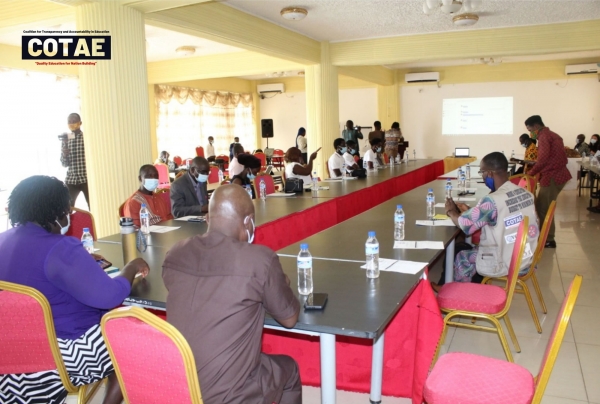Launching the report Wednesday, October 21, 2020, at the Corina Hotel in Sinkor during a one-day policy dialogue on COTAE’s ‘More-for-Education Advocacy Campaign,’ the Co-chair of the House Committee on Education and Chairman of the Committee on Economic Recovery, Honorable P. Mike Jurry lauded COTAE and partners for such a remarkable effort aimed at helping the Government seek innovative and alternative means of funding the country education sector.
But Representative Jurry noted that as important as education is to the stability, sustainable growth, and development of Liberia, competing priorities such as health, water and sanitation, basic infrastructures, and other equally vital services continue to pose challenges to incremental growth in the country’s education budget.
He said despite the overly stretched revenue envelope of the country and with different competing priorities, the legislature has been able to make slight increments in the education budget over the years.
Figures show a steady increment in education allotment graduating from 13.7 percent in the 2017-2018 national budget to 14.7 percent in the 2018-2019 budget and 15.8 percent in the 2019-2020 budgets.
The Harper District, Maryland County Lawmaker also called for synchronization of all support to education being received by the government and partners to inform the campaign for increased budgetary support to education. With support from the United States Agency for International Development’s Liberia Accountability and Voice Initiative (USAID-LAVI) Improving Education through Democracy project, the one-day policy dialogue facilitated learning, sharing, and coordination among education stakeholders, mobilized stakeholders’ support for alternative and innovative strategies of mobilizing additional non-budget resources for education in Liberia, amongst others.
Delivering opening remarks, USAID Liberia Democracy, Rights and Governance Office Team Lead on Civil Society, Media and Conflict, Mandy Dagold said in its endeavors in the education sector, USAID reaffirms its partnership with the Government of Liberia as it closely aligns its strategy with the Government’s Pro-Poor Agenda for Prosperity and Development with a specific focus on Pillar one, ‘Power to the People’, that seeks to empower the people to take control of their lives by providing access to quality education, ensuring access to essential healthcare and increasing opportunities to attain a decent standard of living.
Madam Dagold said since 2018, USAID/ Liberia through the Liberia Accountability and Voice Initiative (LAVI) has supported the national and county- level advocacy coalition More-for-Education advocacy coalition, supporting it to lobby for and with the goal of increasing the national budget allocation to the education sector to a minimum 20% and to encourage the Government of Liberia to fully implement provisions of the 2011 Education Reform Act.
The Government of Liberia has committed to a 20% national budget allocation for education under the Incheon Declaration of 2015, the Dakar Framework of 2014, and the Global Partnership for Education.
She stated that while the Government of Liberia has provided incremental increases to education in the last two national budgets, it remains to be seen if this trend will continue in the recently passed FY2020/2021 budget.
Countries in the sub-regional, including Sierra Leone, Ghana, and Senegal have surpassed the minimum benchmarks with 27%, 35%, and 37% respectively while Liberia stands at 15.7%.
Making special remarks, the Chief of Party of USAID/LAVI, Milica Panic acknowledged efforts of the More for Education campaign to place education on the national agenda particularly with regards to adequate financing and called on members of the campaign to remain engaged with policymakers and other stakeholders.
For his part, the National Coordinator for COTAE, D. Anderson Miamen, said every Liberian should be concerned about education because it borders on national security, development, and the wellbeing of the people.
Mr. Miamen said the More-4-Education Coalition comprises seven (7) National Civil Society Organizations with different thematic areas but working on a goal of contributing to the education sector despite their different areas of focus.
He said the goal of the More 4 Education Advocacy Campaign is to advocate for a minimum of 20% of the National Budget to support education.
The forum brought together lawmakers, government officials, civil society, media, international partners, and other education stakeholders.

